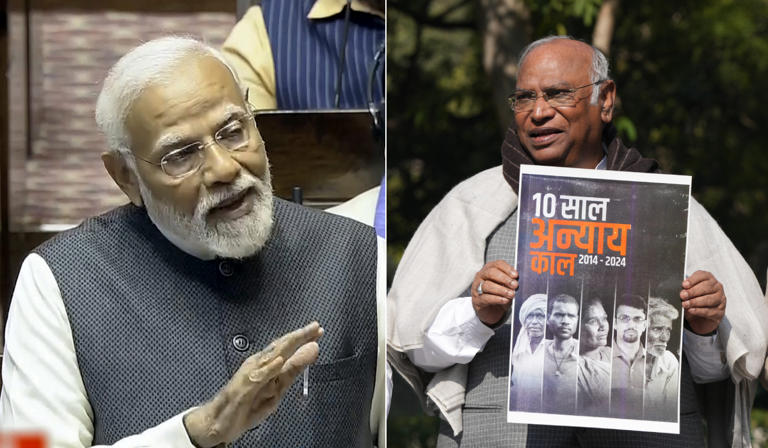The Congress party released a ‘black paper’ on Thursday highlighting what they perceive as the “failures” of the Modi government, citing issues such as unemployment, inflation, and “farmers’ distress.”
Congress president Mallikarjun Kharge unveiled the ‘black paper’ titled ’10 Saal Anyay Kaal’, just ahead of the government’s planned presentation of a ‘white paper’ on the “mismanagement” of the economy before 2014. Kharge explained that the purpose of releasing the ‘black paper’ was to address what he sees as the government’s tendency to downplay its failures and emphasize its successes without addressing criticisms. He specifically mentioned concerns regarding unemployment, which he claimed the BJP government fails to acknowledge.
Kharge criticized Prime Minister Narendra Modi’s responses to issues such as inflation, noting that rather than addressing the problem, Modi compares the current situation with the Congress era. He also questioned the government’s ability to fulfill its promises, particularly regarding job creation and ensuring Minimum Support Price (MSP) for farmers.
In response to the release of the ‘black paper’, Prime Minister Modi characterized it as a “kaala teeka” (black mark) that would deflect attention from his government’s achievements. He expressed gratitude to Kharge for what he described as a symbolic gesture.
The release of the ‘black paper’ coincides with the government’s plan to present a ‘white paper’ comparing the economic performance of the Congress-led UPA government (2004–2014) with that of the BJP-led NDA government. Union Minister Arjun Ram Meghwal announced that a discussion on the ‘white paper’ would take place in the Lok Sabha.
The government’s intention to release a ‘white paper’ was mentioned during the presentation of the interim budget, with Finance Minister Nirmala Sitharaman stating that it would provide insights into the economic conditions during the Congress era and the progress made since 2014. She emphasized the government’s efforts to overcome economic challenges and achieve sustainable growth, attributing their success to effective governance and development initiatives.
Overall, both the Congress party’s ‘black paper’ and the government’s planned ‘white paper’ reflect ongoing political debates regarding economic management and governance in India.



